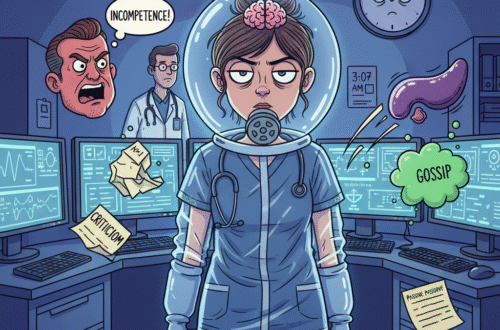Healthcare workers dedicate their careers to caring for others, often neglecting their own needs in the process. The demands of long shifts, constant multitasking, and the emotional toll of patient care can lead to significant stress, fatigue, and burnout. As the saying goes, you can’t pour from an empty cup. This article delves into effective self-care strategies that healthcare professionals can adopt to safeguard their mental well-being, sustain their energy levels, and maintain the high standards of care that their patients deserve.
Understanding Burnout in Healthcare
Burnout is a pervasive issue in the healthcare sector, and it extends far beyond mere exhaustion after a long shift. It manifests as a deep state of physical, emotional, and mental depletion caused by relentless workplace stress. Recognizing the signs of burnout is crucial:
– Chronic Fatigue: Persisting tiredness despite adequate rest.
– Emotional Detachment: A sense of numbness when interacting with patients.
– Increased Cynicism: Heightened irritability towards work and life.
– Lack of Focus: Struggling to concentrate or remember critical details.
– Diminished Work Performance: A noticeable decline in productivity and quality of care.
If you see yourself in any of these symptoms, know that you are not alone. Burnout is increasingly prevalent among healthcare workers, yet it is both preventable and treatable with proper support and self-care strategies.
The Unique Challenges of Healthcare Work
The pressures faced by healthcare professionals are distinctive compared to other occupations. Key stressors include:
– Extended Hours: Shifts often extend 12 hours or longer, including nights and weekends.
– High-Stakes Decisions: Each day carries the weight of life-or-death choices.
– Emotional Challenges: Providing support for patients and their families takes an emotional toll.
– Documentation Demands: The burden of extensive paperwork, electronic medical records, and policy adherence.
– Staffing Shortages: Increased workloads due to fewer staff members available to meet patient needs.
Given these factors, prioritizing self-care strategies is not merely a luxury; it’s an essential survival tool for those in healthcare.
Self-Care Strategies for Healthcare Workers
1. Prioritize Your Sleep
Establish a consistent sleeping routine. Consider dark curtains and avoiding screens at bedtime. For night shifts, blackout shades and white noise machines can make a world of difference. Napping strategically on long shifts can also help to recharge your energy.
2. Make Nutritional Choices
Instead of relying on vending machines, bring balanced meals and healthy snacks to work. Staying adequately hydrated is vital, as dehydration can exacerbate feelings of fatigue and lead to headaches. Use caffeine wisely and avoid it within six hours of planning to sleep.
3. Incorporate Movement Throughout Your Shift
Even on busy days, find ways to incorporate physical activity. Quick stretches or micro-exercises—like squats or yoga poses—during downtime can enhance circulation and alleviate built-up tension, ultimately boosting your overall energy.
4. Cultivate a Support Network
Don’t underestimate the value of camaraderie. Share your challenges with coworkers and seek mentorship from seasoned professionals. Maintain connections with family and friends outside of work and consider joining professional forums or online communities for additional support.
5. Establish Firm Boundaries
Learning to say “no” to additional shifts when you’re already feeling depleted is crucial. Use your paid time off without guilt and strive to keep work at work by avoiding charting at home unless it’s unavoidable.
6. Use Humor as a Healing Tool
Laughter can be a powerful medicine. Share light-hearted stories and humorous experiences with colleagues when appropriate. Engaging with uplifting content during your commute can significantly lighten your mood.
7. Don’t Hesitate to Seek Professional Help
If stress becomes overwhelming, don’t hesitate to reach out for support. Employee assistance programs, therapists, or counselors can provide the guidance you need. Remember, seeking help is a sign of strength, not weakness.
Quick On-Shift Burnout Relief
– 5-Minute Reset: Step outside for fresh air and a moment of mindfulness.
– Hydration Reminder: Keep a filled water bottle at your desk and set reminders to take sips throughout the day.
– Positive Reflections: At the end of each shift, jot down one positive moment with a patient to combat cynicism.
Fostering a Culture of Wellness in Healthcare
While individual self-care practices are vital, creating a culture of wellness requires systemic change. Healthcare institutions must ensure adequate staffing and favorable patient ratios. Leadership should promote regular breaks and normalize discussions about mental health within the workplace. Encouraging team support in establishing wellness habits can create a more balanced work environment.
Conclusion
Self-care strategies are not about indulging in extravagant spa days; they are about adopting small, consistent practices that nurture your body, mind, and spirit, shift after shift. If you are navigating the tough terrain of burnout, remember that you are not alone. This occupational hazard does not have to define your career. Engage with your community, share your strategies, and together we can build a more resilient healthcare workforce. Your insights could help a fellow nurse, doctor, or student find balance on their next shift.





